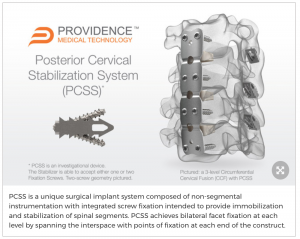Providence Medical Technology Announces First Patient Enrollment in the “FUSE” IDE Clinical Study
The FUSE Study is designed to demonstrate the superiority of Circumferential Cervical Fusion over traditional ACDF in patients at high risk for nonunion or revisions.
PLEASANTON, Calif., June 15, 2020 /PRNewswire/ — Providence Medical Technology, Inc., a medical device innovator focused on improving surgical outcomes of the cervical spine, announced initiation of enrollment in a human clinical Investigational Device Exemption (IDE) study evaluating the safety and effectiveness of its Posterior Cervical Stabilization System (PCSS) in patients with 3-level degenerative disc disease. The first case was performed by Dr. Pierce Nunley, MD, Director of the Spine Institute of Louisiana in Shreveport, Louisiana.
The FUSE clinical study is a prospective,  multi-center, randomized, controlled study toevaluate the safety and efficacy of Providence’s PCSS as an adjunct to tissue-sparing posterior cervical fusion with CORUS Spinal System used in combination with anterior cervical discectomy and fusion (ACDF) for the treatment of multi-level cervical degenerative disease. The study is designed to demonstrate that Circumferential Cervical Fusion (CCF) achieves superior clinical outcomes versus ACDF for the treatment of 3-level cervical degenerative disc disease.
multi-center, randomized, controlled study toevaluate the safety and efficacy of Providence’s PCSS as an adjunct to tissue-sparing posterior cervical fusion with CORUS Spinal System used in combination with anterior cervical discectomy and fusion (ACDF) for the treatment of multi-level cervical degenerative disease. The study is designed to demonstrate that Circumferential Cervical Fusion (CCF) achieves superior clinical outcomes versus ACDF for the treatment of 3-level cervical degenerative disc disease.
PCSS is a unique surgical implant system composed of non-segmental instrumentation with integrated screw fixation intended to provide immobilization and stabilization of spinal segments. PCSS achieves bilateral facet fixation at each level by spanning the interspace with points of fixation at each end of the construct.
Providence CEO & Co-founder, Jeff Smith, explained the importance of the FUSE Study: “Our purpose at Providence is to improve clinical outcomes for high-risk patients and prevent surgical failures of the cervical spine. Although ACDF has proven to be safe and effective for most 1 and 2-level surgeries, approximately 80,000 cervical fusion patients require revision surgery annually in the United States. Certain risk factors such as multi-level disease, nicotine use, and diabetes increase rates of complications, pseudarthrosis, and surgical revision. Circumferential stabilization is the standard of care in lumbar fusion but is rarely performed in the cervical spine due to limitations of existing product offerings. We believe the combination of anterior and posterior cervical fusion with PCSS addresses a significant unmet need and are on a mission to establish CCF as the standard of care for high-risk patients. The FUSE Study is an important next step towards that goal, and we are grateful for the support and dedication of our clinical investigators.”
“There are many unanswered questions regarding the best technique for performing a 3-level cervical fusion and weighing the risks and benefits of anterior versus circumferential fusion is challenging,” noted Dr. Pierce Nunley of the Spine Institute of Louisiana. “This is the first high-quality study to help determine these answers. I am grateful to play a role in this important research and for Providence’s commitment to support and fund this project that will ultimately improve patient care.”
The FUSE study’s primary endpoint is superiority in fusion success in Circumferential Cervical Fusion (CCF) compared to anterior cervical discectomy and fusion (ACDF) at 12 months. The target population consists of patients with 3-level cervical disease, including those with risk factors for nonunion such as a history of smoking and advanced age (65+) who have typically been excluded from fusion clinical studies. The control group will receive an anterior cervical discectomy and fusion (ACDF) with allograft bone and a metal plate. The investigational group will receive a Circumferential Cervical Fusion (CCF) consisting of an ACDF with allograft and plate as well as a posterior cervical fusion using Providence’s PCSS.
About Providence Medical Technology, Inc.
Providence Medical Technology, Inc. is a privately held medical device company focused on innovative and tissue-sparing surgical solutions for cervical spine surgery. Its purpose is to improve clinical outcomes for high-risk patients and prevent surgical failures of the cervical spine. Its mission is to establish Circumferential Cervical Fusion (CCF) as the standard of care for high-risk patients. The Company has pioneered a proprietary approach to posterior cervical fusion and has developed surgical instrumentation and implants that address the unmet clinical need of, and offer unique benefits to, the $2 billion worldwide cervical spine market.
The Providence family of products includes the CORUS™ Spinal System, CAVUX® intervertebral implants, ALLY® bone and facet screws, and ENTRUS™ Allograft Bone. All implants and instruments are sterile-packaged and single-use to maximize perioperative efficiency and ensure consistent quality and performance.
For more information, please visit providencemt.com/pcss and fusestudy.com.
SOURCE Providence Medical Technology

